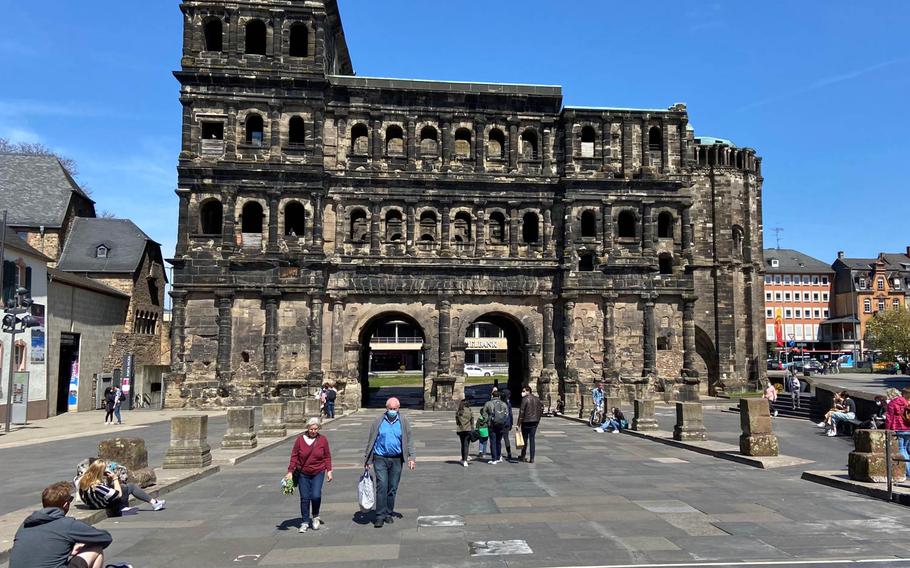
People stroll in front of the Porta Nigra, an ancient Roman city gate, in Trier, Germany, April 24, 2021. Rheinland-Pfalz, home to tens of thousands of U.S. personnel, is relaxing restrictions in areas with low incidence rates of the coronavirus. Trier, with a weekly incidence of 37.7 new cases per 100,000 residents, has the lowest rate in Rheinland-Pfalz. (Ann Pinson/Stars and Stripes)
Stars and Stripes is making stories on the coronavirus pandemic available free of charge. See more staff and wire stories here. Sign up for our daily coronavirus newsletter here. Please support our journalism with a subscription.
More retail businesses and hotels may reopen in Rheinland-Pfalz under state rules issued Wednesday, but Kaiserslautern and other areas where U.S. personnel live will stay under tighter restrictions while coronavirus incidence rates remain high.
Businesses in cities and districts with a weekly average incidence rate of 100 new cases per 100,000 people for five consecutive days were allowed to open and offer test-free shopping as of Wednesday, the regulation said. Twenty-four of the state’s 36 cities and districts fall under the benchmark incidence rate, according to the Robert Koch Institute, Germany’s disease control agency.
Rheinland-Pfalz Gov. Malu Dreyer announced the rules in a three-stage plan meant to guide the state to normal activity as overall coronavirus rates fall from their recent highs. Several other German states are expected to issue their own relaxed rules in the coming days.
The plan allows the state “to go forward with careful steps toward a good summer,” Dreyer said in a statement.
Business and leisure travelers may stay in hotels and hostels with individual bathrooms in areas with average rates below 100 new cases per 100,000 people. They must show a negative coronavirus test taken within 24 hours at check-in and obtain another test every 48 hours, the regulation stated. Hotels may only serve meals in individual rooms.
Travelers staying in recreational vehicles with their own sanitation facilities aren’t required to be tested at campgrounds, the regulation said. Tourists staying in vacation rentals, such as those found on Airbnb, also don’t need tests, state officials told Stars and Stripes.
All hotels in areas below the 100 new cases per 100,000 people benchmark are scheduled to open beginning June 2, regardless of their bathroom or meal accommodations, to customers with negative tests. Indoor dining, swimming pools and cultural attractions are also scheduled to open then, the state said.
The regulation also relaxed rules on sports activities in areas under the 100 new cases per 100,000 people incidence rate. Outdoor sports where social distancing can be kept are allowed. So are sports activities involving up to 20 children where distancing cannot be kept.
On May 21, the state plans to allow cultural events outside with up to 100 people who can provide negative tests in areas under the rate of 100 new cases per 100,000 people, a Rheinland-Pfalz statement said.
Also on May 21, restaurants will be able to offer in-person dining in cities and districts with average rates of 50 new cases per 100,000 people, the new regulation said.
Bitburg-Pruem district, which includes Spangdahlem Air Base, had an average of 87 cases per 100,000 residents as of Tuesday.
The city of Kaiserslautern will remain under the more stringent rules for now. It had a seven-day average of about 148 new cases per 100,000 people as of Tuesday.
The surrounding Kaiserslautern district, which includes Ramstein Air Base, had an average of about 107 new cases per 100,000 people. If Germany counted U.S. personnel in those numbers, as advocated by district officials, the figures would be down to 91 new cases per 100,000 people.
Elsewhere in Germany, Bavaria has relaxed some of its restrictions. Beer gardens, outdoor areas of restaurants and movie theaters were allowed to open Monday to customers with proof of a negative coronavirus test. Hotels are scheduled to open May 21.
Baden-Wuerttemberg, which includes U.S Army Garrison Stuttgart, has been slower to ease restrictions. Only seven of its 44 cities and districts meet the weekly average incidence rate of 100 new cases per 100,000 people, SWR reported.